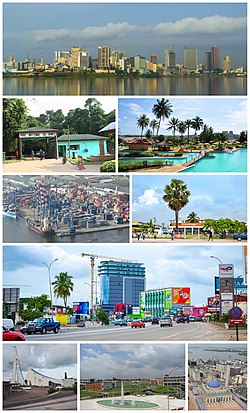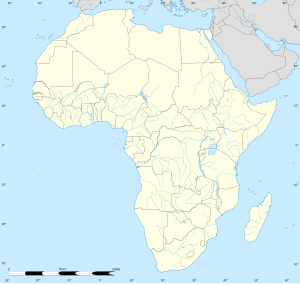
Back Abidjan Afrikaans Abidjan ALS አቢጃን Amharic أبيدجان Arabic ابيدجان ARZ Abidjan AST Abican Azerbaijani Abidjan BAN Abidžans BAT-SMG Abidjan BCL
Abidjan | |
|---|---|
City and autonomous district | |
| Autonomous District of Abidjan District Autonome d'Abidjan (French) | |
 Clockwise from top: Skyline of the Plateau commune, entrance of the Banco forest, pool of the Hotel Ivoire, a dock of the Autonomous Port of Abidjan, a main street of the Koumassi commune, a main avenue of Abidjan, St. Paul's Cathedral of Abidjan, the Université Félix Houphouët-Boigny, Abidjan Great "Salam" Mosque | |
| Nickname: "Babi" | |
| Motto(s): "District d'Abidjan, acteur de développement" | |
 Map of the 10 communes which formed the former City of Abidjan (422 km2), now included in the larger Autonomous District of Abidjan (2119 km2) | |
| Coordinates: 5°19′N 4°2′W / 5.317°N 4.033°W[1] | |
| Country | |
| District | Abidjan |
| Department | Abidjan |
| Government | |
| • Governor | Robert Beugré Mambé |
| Area | |
| • Total | 2,119 km2 (818 sq mi) |
| • City | 422 km2 (163 sq mi) |
| Elevation | 18 m (59 ft) |
| Population (14 Dec. 2021 census)[3] | |
| • Total | 6,321,017 |
| • Density | 3,000/km2 (7,700/sq mi) |
| • City | 5,616,633 |
| • City density | 13,000/km2 (34,000/sq mi) |
| Demonym | Abidjanais |
| Human Development Index | |
| • HDI (2018)[4] | 0.619 (medium) |
| Time zone | UTC+0 (GMT) |
| Area code | +225 |
| Website | abidjan.district.ci (in French) |
Abidjan (/ˌæbɪˈdʒɑːn/ AB-ih-JAHN, French: [abidʒɑ̃]; N'ko: ߊߓߌߖߊ߲߬) is the largest city and the former capital of the Ivory Coast. As of the 2021 census, Abidjan's population was 6.3 million,[3] which is 21.5 percent of overall population of the country, making it the sixth most populous city proper in Africa, after Lagos, Cairo, Kinshasa, Dar es Salaam, and Johannesburg. A cultural crossroads of West Africa, Abidjan is characterised by a high level of industrialisation and urbanisation. It is also the most populous Dioula-speaking and French-speaking city in Africa (Kinshasa being mainly Lingala-speaking).
The city expanded quickly after the construction of a new wharf in 1931, followed by its designation as the capital city of the then-French colony in 1933. The completion of the Vridi Canal in 1951 enabled Abidjan to become an important sea port. Abidjan remained the capital of the Ivory Coast after its independence from France in 1960. In 1983, the city of Yamoussoukro was designated as the official political capital of Ivory Coast. However, Abidjan has officially been designated as the "economic capital" of the country, because it is the largest city in the country and the centre of its economic activity. Many political institutions and all foreign embassies continue to be located in Abidjan as well. The Abidjan Autonomous District, which encompasses the city and some of its suburbs, is one of the 14 districts of Ivory Coast.
- ^ "Côte d'Ivoire Cities Longitude & Latitude". sphereinfo.com. Archived from the original on 13 September 2012. Retrieved 18 November 2010.
- ^ "District d'Abidjan ::: Site Officiel". Districtabidjan.org. Archived from the original on 6 May 2013. Retrieved 20 June 2013.
- ^ a b Institut National de la Statistique de Côte d'Ivoire. "RGPH 2021 Résultats globaux" (PDF). Retrieved 9 August 2022.
- ^ "Subnational Human Development Index (4.0) [Sud, Abidjan – Côte d'Ivoire]". Global Data Lab of Institute for Management Research, Radboud University. Retrieved 12 November 2018.



